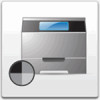Lexmark Monochrome Laser Complete Printer Reference (1.7 MB) - Page 112
Using separator sheets, Memory constraints, The Collation - Collated Copies QTY setting, on
 |
View all Lexmark Monochrome Laser manuals
Add to My Manuals
Save this manual to your list of manuals |
Page 112 highlights
The printer Collation setting causes the operating system to handle the print job and all its collated copies as one single job. The Collation - Collated Copies (QTY) setting, on the other hand, causes the printer to handle each collated copy as a unique job. You can, if you choose, use software applications to collate print jobs, but because such applications resend the job for each copy you request, you may experience print time delays. In addition, multiple collated copies of very large jobs require huge amounts of disk space to buffer the job effectively. To ensure that the printer performs the collation function, set Collation On using the printer operator panel, and make sure collation is turned off in the software application and driver. Using separator sheets Use the Separator Sheets menu item on the Finishing Menu to insert blank pages between jobs or between copies. This feature is especially helpful when processing several collated documents. Use the Separator Source menu item to identify a specific paper source where you have loaded the paper you want to use as separator pages. Memory constraints Occasionally your printer may experience a memory shortage while printing a collated job. If this happens, the printer displays a 37 Insufficient Collation Area error message, pauses for a period of time, then continues to collate the job. Note: You must have previously set the Auto Continue menu item to On if you want the printer to continue printing after experiencing a memory shortage. If you frequently collate large print jobs, you can help avoid memory problems by installing an optional hard disk device. Remember, though, that if you partition the hard disk for job buffering, you can't use that particular storage area for collation. See "Managing memory" on page 164 for more information on memory usage and solving memory related problems. Paper handling 112















